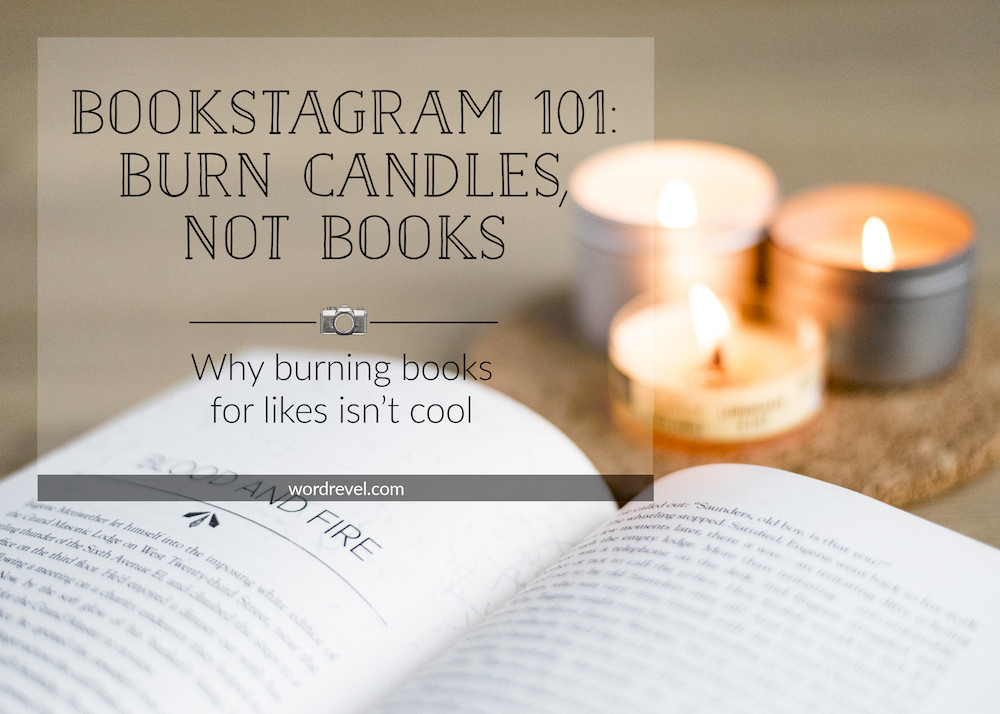
Every time I come across a photo on Instagram with books on fire, a part of my soul dies. To be clear, it’s not the same as when I cringe at dogeared pages, cry at tea spilled on a book or broken spines. It goes beyond that. Burning books isn’t simply about what one does with their personal belongings — it’s about the symbolism behind it, the historical and cultural implications, and so much more.
If you’re on bookstagram, you’ve likely heard of or even read The Book Thief by Marcus Zusak and Fahrenheit 451 by Ray Bradbury. The former is a novel based on World War II, the Holocaust and book burnings. The latter is a cautionary tale, partially about book burnings as well.
Reading these should already give insight into why burning books, regardless of motivation, isn’t such a great idea. In any case, let me outline why you should reconsider burning books for bookstagram photos.
Book Burnings throughout History
Book burnings in general have happened throughout history, throughout the world. You can find a list of book burnings on Wikipedia, which is incredibly long.
Nazi Book Burnings
As the Nazis ascended to power in Germany in the 1930s, books that were deemed against the “German spirit”, including Jewish literature, were banned. Most notably, on May 10, 1933, over 20,000 books were burnt at the Opernplatz in Berlin. Dozens upon dozens of book burnings led by the Nazis were held across Germany on the same day. Many more books were burnt in other towns and cities in June 1933. Book burnings were acts of persecution. First they eradicated books, then they set up concentration camps where they murdered countless people.
Dort wo man Bücher verbrennt, verbrennt man auch am Ende Menschen.
[There where they burn books, in the end, they burn humans too.]
—Heinrich Heine
Terrorist Book Burnings
More recently, in 2015, extremists burnt thousands of books and manuscripts in Mosul. This wasn’t an isolated incident. They’ve targeted other libraries as well. It’s not a coincidence that libraries suffer at the hands of wars, dictatorships and terrorism. They contain ideas and preserve culture.
The Significance of Burning Books
Book burnings are often symbols for censorship and oppression. That’s why they cannot be taken lightly. How is that significant for a bookstagrammer? Posting a photo of burning books on Instagram essentially makes this act public. It’s an invitation for followers and beyond to view books being burnt, even if it’s not live.
To burn books for the sake of aesthetics without intending to make a statement, still makes a statement — that one ignores or is ignorant of what burning books means to many people. It collectively disregards cultures and communities that were attacked and are being attacked today through book burnings.
Safety and the Law
Aside from the cultural, political and historical implications, burning books is dangerous and potentially illegal. In March this year, a wildfire broke out in Florida because a man burnt books. 200 people had to be evacuated; at least two homes were burnt down. When you’re behind the camera, focussed on taking photos, you might not be able to react quickly enough to put out a fire if sparks fly.
As in Florida, open fires are prohibited in Singapore. Laws differ, of course, depending on where you live but this is also something to consider.
Burn Candles Instead
When it comes to hashtags like #burningpages, #booksonfire, #flamingpages and #bookishfire, I strongly advocate that you should not burn books. Light candles instead. Sit by a fireplace. There’s no good reason to set books on fire just for likes.

Thank you for this post! I’m so glad that you highlighted the historical significance of book burning. All art sends a message, intentional or not, and it’s so important that people know the symbolism behind what they create. I’d like to hope that the people who do burn books for bookstagram just didn’t make the connection to the significance of the act. But it’s high time for the issue to be addressed, so thank you again for doing so.
I whole-heartedly agree with your statement, “All art sends a message, intentional or not.” Bookstagram might not be art in the strictest sense but for many, it is about the aesthetics. That makes it important to think about what we post for the world to see, especially when the primary subjects are books — the very objects that are burned when people, their knowledge and their cultures are attacked.
I had no idea people were doing this! This is really sad and depressing. 😫 I totally agree with you that people can’t claim “aesthetic” when something is steeped in oppressive history. It’s so wrong and disappointing. Gah.
Yeah, a handful surface every now and then :( Most of them don’t make the connection, while some aren’t even aware of the historical significance of book burnings either. That’s why I thought it was high time I addressed this and compiled some relevant links.
Thank you for writing this! When I first saw burning book pictures, the first thing that come to my mind is usually “what a waste” but if I think deeper, one of my main reason to dislike it is the symbolism the act presents. Like you said, in time of war and conflict, people usually burn books in order to destroy the knowledge and culture the other group has. But again, it’s also dangerous. A lot of things could go wrong when people plays with fire, and the consequences can be dire! Amazing post Josephine!
Exactly. Burning books goes beyond being wasteful (which isn’t ideal too, of course) and we need to be mindful of how it has affected and still affects people today. And yes! Safety matters :)
I 100% agree with your post! I’ve never understood why people would want to set their books on fire in the first place as they spent money and getting them – but more importantly in the historical context. I feel like there are so many ways to creatively take pictures of a book or even use them to create art that doesn’t include burning them and ignoring the significance of such an act!
Same. I was horrified the first time I saw such a photo on Instagram. Every additional one I’ve seen since then just made me sad. Some argue that if they burn a book that they weren’t going to keep anymore, one that they hated, or one that was already damaged, that’s fine. I think even in such cases, we can’t divorce history and culture from this kind of destruction.
People actually burn books?! I’ve never actually seen it, but I’m shocked! Honestly, I didn’t know about book burnings and I’m sure lots of people don’t, either, but that’s not even an excuse.
And also, I think I’d get quite angry if I’d ever see a picture of a burning book. Don’t people realise books are a luxury to some people? I mean, if you’re burning a book, you might as well give it to a person who can’t afford to buy books or go to the library. It’s so upsetting!
Hmmm. It’s interesting that you should mention that many don’t know about book burnings. It’s something that I learnt of in schools, not only in Germany but in Singapore too, where it came up during talks of Chinese history. And even if it doesn’t come up in history lessons, there’ve been several cases over the past decade that were reported in the news. Guess it’s not been far-reaching enough.
I think sometimes it’s difficult to donate books, depending on where we live. For instance, I have a bunch of German books but since it’s not a local language, there’s nobody to give them to. I can’t afford to ship them all overseas either. I’ll probably have to recycle them.